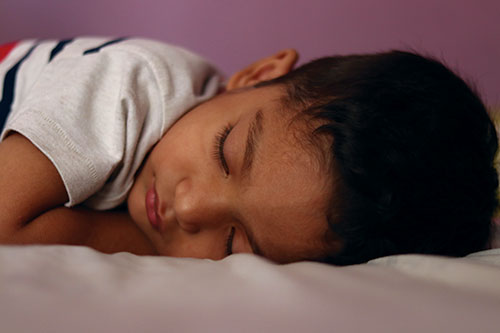Managing Nighttime Wetting
 Nighttime wetting is fairly common, especially for younger children. In fact, up to 20% of 5-year-olds wet the bed at night.
Nighttime wetting is fairly common, especially for younger children. In fact, up to 20% of 5-year-olds wet the bed at night.
Although most children outgrow nighttime wetting by the time they reach school age, many continue to experience at least occasional episodes of wetting well after they've started school (up to 3% of children still wet the bed at age 9).
This can become very frustrating for both children and parents. A number of factors can contribute to this problem; some are medical or developmental, while others are behavioral. If a child continues to have frequent nighttime wetting by age 7 or 8, it may be time to intervene. Here are several strategies that may help you resolve this issue:
-
First and foremost, discuss the issue with your child's pediatrician. You'll want to rule out any medical causes for nighttime wetting before turning to behavioral intervention. Some physicians may prescribe medications that treat nighttime wetting. These medications can be very effective, but they may interfere with behavioral strategies prescribed by a behavioral health specialist. If you're getting assistance in both the medical and behavioral areas, it is important that your child's pediatrician and behavioral health specialist coordinate their treatment approaches.
-
Motivation is a key to successfully addressing nighttime wetting. Both you and your child must make a commitment to taking the steps necessary to eliminate the problem.
-
Teaching children how to “hold" their urine can be beneficial. This helps them strengthen the muscles that are associated with controlling urine flow and extending bladder capacity. Your child's pediatrician may suggest using “Kegel exercises" to help strengthen these muscles. These exercises include having your child hold his or her urine as long as possible before urinating or stopping urination in midstream.
-
When your child remains dry throughout the night, give him or her lots of praise and a reward. The reward might be a special activity or item that you think will motivate him or her to continue having dry nights.
-
One of the most effective ways to treat nighttime wetting is using a wet alarm. A product called the Wet Alarm 3, which can be purchased online, is a sensor that clips on to your child's pajamas. As soon he or she starts to urinate, an alarm sounds. Besides alerting children that they have started to wet, the alarm also motivates them to stay dry in order to prevent the alarm from sounding.
-
When your child does wet the bed at night, it is important to have him or her remove the wet bedding and clothing and replace them with dry items. Your child also should help wash and dry the wet bedding and clothing the next day. You'll need to provide some supervision for this, but again, it is important that your child helps take responsibility for dealing with the results of his or her nighttime wetting.
-
Finally, limiting the amount of liquids your child consumes at night before bedtime will not eliminate wetting. Research shows that this does not necessarily eliminate wetting and may only limit the amount of wetting that occurs.
Additional Resource
-
It's No Accident: Breakthrough Solutions to your Child's Wetting, Constipation, UTI's and Other Potty Problems by Steve Hodges
Download Printable Version
Kid Tips;Sleep Issues
